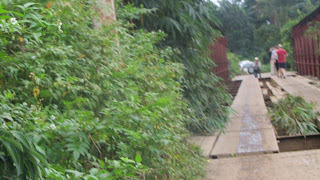THE HEALTHY MODEL VILLAGE
I left the bathroom and sat back down at my desk in the library reminiscing on our travel and tour of the "Healthy Model Village" in Fontsimavo, a small remote community, a few hours from Tamatave, a main city, that was our home base in Madagascar. The healthy model village, a project designed to help facilitate clean water, well-built latrines and primarily education to rural areas in an effort to reduce diarrheal diseases.
We traveled by SUVs and a "open back" truck filled with luggage to Fontsimavo. Rolling deep of course, 4 real doctors, me (I'm a doctor in the making really!) 2 pediatric nurses, Ginny, CRMF Director and amazing organizer of our trip, Brother Edwin, Andy, Ginny's sister, 10 peace core volunteers and who am I forgetting? of course! Darwin, CRMF trustee and avid french speaker and multi-purpose team member. "Darwin, we need electricity!" was a common statement he heard and a need he always fulfilled to help us get our ultrasound working so we could evaluate our OBGYN patients.
I can't talk about our trip to the healthy model village without talking about the travel. We traverse long winding, bumpy roads, mostly made of potholes with very little road, and get this crossed a river using rafts to transport the SUVs to get to the healthy model village.
The bridge, yes bridge we crossed, don't miss those planks, or else!
We get to the River
Brave "water walkers", shall remain un-named
Video: Car crossing the river on raft, so creative, and a multi man operation.
Mission accomplished!
We cross and walk up a short hill, some were driven while others walked about 2 miles. I was one of the walkers, I wanted to test out my new waterproof hiking shoes. At the end of our journey we walked right into a welcome party organized by the team at Fontsimavo. We are given gifts and enjoy a beautiful dance performed in our honor.
Wearing our "Lambda Hoaney"(spelling?)
The beautiful wraps all with different special messages for us.
(Bro. Edwin, Ginny Dr. Wiltse, Ally, Kris, Andy, Dr. Huxley, Darwin, Ruina (sp), Me, Dr. Alexander, Dr. C aka Dr. Egner)
(Bro. Edwin, Ginny Dr. Wiltse, Ally, Kris, Andy, Dr. Huxley, Darwin, Ruina (sp), Me, Dr. Alexander, Dr. C aka Dr. Egner)
Sitting upfront to enjoy the demonstrations through skit, dances and song of all people have learned about hand washing, sanitation and the importance of well built latrines that don't leave human waste open to causing infectious disease.
At the Fontsimavo Village
Latrine demonstration.
Ginny receiving Chickens as a thank you!
Dr. C and I in our wraps
Trying to blend in like a Malagasy
Latrine built by digging a very deep underground area, covered by concrete, and water buckets available to flush the toilet. This type of toilet requires squatting, which is ideal positioning for increasing abdominal pressure and ... you get the point... :)
Brother Edwin congratulating the people of two villages who have together installed over 300 latrines in their villages. Open defecation was previously a major issue in causing a plethora of diarrheal diseases.
After a long day, Sister Christine prays as we sit down for dinner at the Nunnery where we will spend the next 2 days administering medical care.
The next time you drink a refreshing bottle of water and then run to use the porcelain toilet, think of how blessed we are. If you would like to learn more about Caring Response Madagascar Foundation, visit http://www.caringresponse.org/ or look them up on facebook.
Thank you for reading, Veluma (Goodbye in Malagasy)!
Next blog - our medical work in the clinics.
Peace & Love!
Sash :)
p.s. My waterproof shoes weren't high enough...hehehe
Hehehe.... Don't worry he made it!


















































